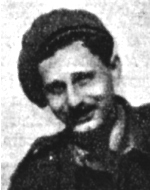Hamitzer, Emanuel
Son of Ella and Raphael, was born on 19.1.1913 in the city of Leipzig, Germany. His father, a doctor, and a sculptor sent nine high school grades to the graphics academy in his hometown. He studied at the academy for three years. During this period, he had many talents. He composed songs and humorous things with illustrations in pen and brush. Afterward he worked for two years in his father’s studio, where he did several engravings (Simone, Bereishit, and Song of Songs). Then he decided to specialize in architecture. He studied drawing plans and worked as a builder. In 1933 he left Germany, and for training for the Land of Israel he moved to Switzerland and worked for a year in the city of Interlaken in a factory producing wooden houses and wooden floors. In 1934 he came to Israel as a tourist, returned to Switzerland and continued to specialize in the manufacture of building tiles. At the end of two years, in 1936, he returned to Israel and settled there permanently. At first he worked in a factory for building boards in Haifa, but out of his love of nature and in order to become more rooted in the country, he moved to Atlit and worked in agriculture. He dedicated his spare time to painting. Was a sworn pacifist, full of love and detest all violence. Nevertheless, he volunteered for the British army as the Nazi enemy approached the gates of the homeland. In June 1941 he enlisted and participated in the war until its conclusion. At first he was one of those leaving the railway in Libya and the Red Sea, then in the fifth company of the water transporters, and finally participated in the invasion of Italy. When he returned from Italy he brought with him his wife who was in Florence. In June 1946, he was discharged from the army, settled in Jerusalem, and opened a pottery and woodworking workshop in the Katamon neighborhood. With the outbreak of the War of Independence he was forced to leave the neighborhood and move with his family to Tel Aviv. On 28.5.1948 he joined the Givati Brigade and was assigned to Nitzanim. After the progress of the Egyptian column near Ashdod was halted, Kibbutz Nitzanim remained behind. The Egyptians understood that this point could serve as a basis for the activity of our forces in the rear and therefore concentrated considerable force in order to conquer it. The Egyptian attack was launched on June 7, 1948. In the early hours of the night, the agriculture was severely shelled, and in the morning the infantry assault began, but this was stopped by the defenders. The Egyptians increased the shelling and even activated planes that bombed the agriculture and caused heavy damage. Under this cover, Egyptian infantry and armored forces advanced and managed to penetrate the agriculture and take control of it. In this battle he fell on the 29th of Iyar 5708 (7.6.1948) and there he was brought to eternal rest. He left behind a wife and child.
